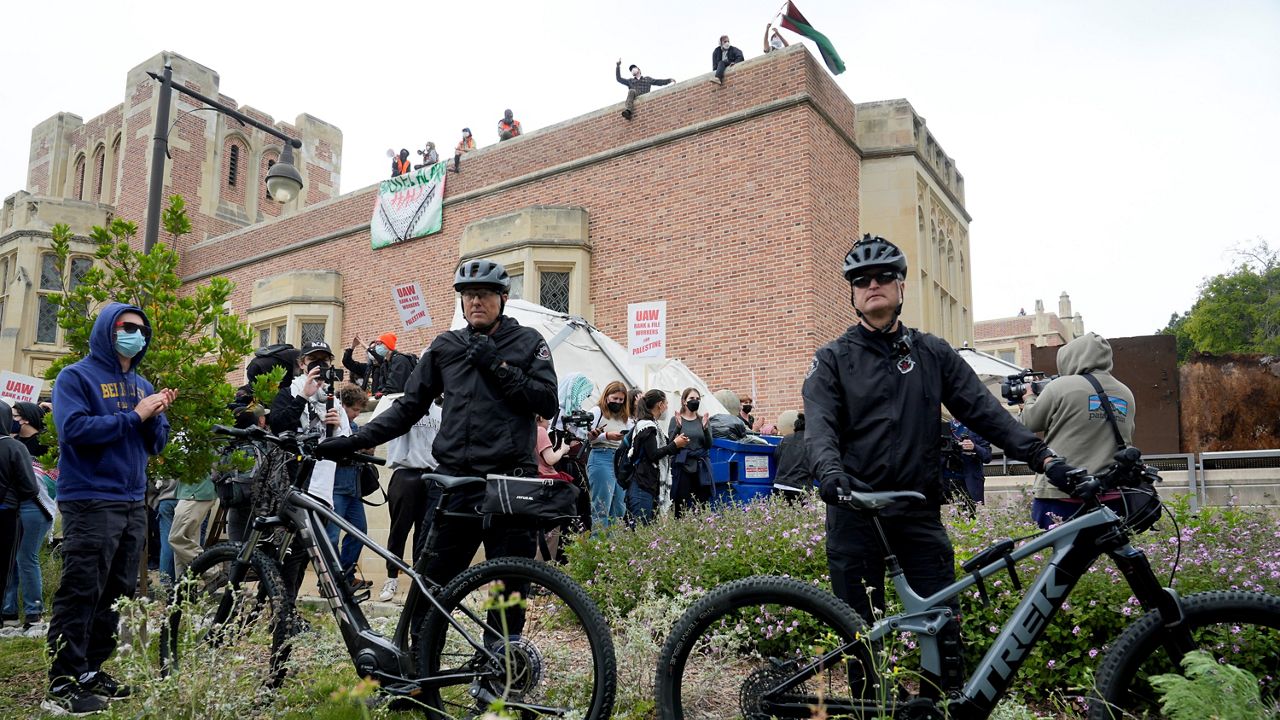LOS ANGELES — Three UCLA students and a professor filed an amended complaint Tuesday in their lawsuit against UCLA for its alleged role in helping antisemitic agitators exclude Jews from campus during protests last spring.
Lawyers for the plaintiffs said the updated lawsuit reveals more of UCLA's alleged failures to stop antisemitism on campus during and after the rise of the initial so-called Jewish exclusion zone and details how each defendant was personally involved.
The complaint, filed in Los Angeles federal court, also describes how student groups have responded to the one-year anniversary of Hamas's terrorist attacks on Israel, with one student group memorializing the Oct. 7 massacre and another encampment forming Monday on the UCLA campus.
The updated document mentions a recently filed report by UCLA's own Task Force to Combat Antisemitism and Anti-Israeli Bias, which sharply criticizes the university for its antisemitic actions and environment. The report, which surveyed 428 members of UCLA's Jewish community, details the systematic exclusion of Jews from UCLA's campus and documents over 100 reports of individuals who were physically attacked or threatened. Additionally, three- quarters of respondents felt that antisemitism is "taken less seriously than other forms of hate and discrimination at UCLA," the report said.
U.S. District Judge Mark C. Scarsi ordered UCLA in August to stop helping antisemitic agitators exclude Jews from parts of campus, calling the university's actions "abhorrent" and "unimaginable."
The plaintiffs said UCLA responded by insisting that it bears no blame for the rampant antisemitism it encouraged and facilitated, and that any harm to Jewish students and faculty was "not by reason of anything (UCLA) did or failed to do."
The temporary injunction issued by Scarsi orders UCLA to prevent alleged antisemitic zones such as the encampments in April that reportedly blocked Jewish students from parts of campus. Attorneys said it is the first such ruling in the nation against a university.
The court order comes as a result of a lawsuit against UCLA filed in June in which two law students and an undergraduate allege the university allowed a group of students and outsiders to set up a pro-Palestinian encampment that forcibly kept Jewish students and faculty from accessing critical parts of campus.
UCLA allegedly reinforced the zones — both by providing metal barriers and by sending away Jewish students — while taking no effective action to ensure safe passage for the students, the suit said. In response to the complaint, UCLA disavowed any obligation to protect its Jewish students, the judge wrote.
"In the year 2024, in the United States of America, in the State of California, in the City of Los Angeles, Jewish students were excluded from portions of the UCLA campus because they refused to denounce their faith," Scarsi wrote in his August order.
"This fact is so unimaginable and so abhorrent to our constitutional guarantee of religious freedom that it bears repeating, Jewish students were excluded from portions of the UCLA campus because they refused to denounce their faith. UCLA does not dispute this. Instead, UCLA claims that it has no responsibility to protect the religious freedom of its Jewish students because the exclusion was engineered by third-party protesters."
The judge continued, "But under constitutional principles, UCLA may not allow services to some students when UCLA knows that other students are excluded on religious grounds, regardless of who engineered the exclusion."
Scarsi denied a bid by UCLA to stay the permanent injunction.
Mary Osako, UCLA vice chancellor for strategic communications, said in a statement at the time that "UCLA is committed to fostering a campus culture where everyone feels welcome and free from intimidation, discrimination, and harassment. The district court's ruling is improper and would hamstring our ability to respond to events on the ground and to meet the needs of the Bruin community. We're closely reviewing the judge's ruling and considering all our options moving forward."
The plaintiffs allege the so-called pro-Palestinian zones broke civil rights laws and discriminated against the university's Jewish students.
One person was in police custody Tuesday for failing to disperse during an hourslong pro-Palestinian protest at UCLA involving at least 40 people. The demonstrators gathered in Dickson Court North on Monday for what was billed as a "teach-in on divestment," where they used unauthorized structures and assembled in areas not designated for public expression.



